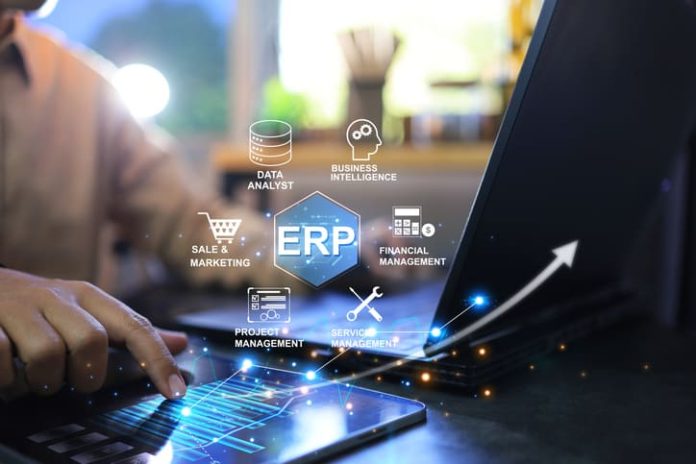The digital economy functions at a rapid speed thus creating intense business demands to speed up operations through data-driven decisions. Enterprise Resource Planning (ERP) serves as the most dominant tool which enables these capabilities. The comprehension of ERP becomes critical for all businesses from large enterprises to growing businesses because both success and operational optimization depend on it.
What is ERP?
ERP software defined Enterprise Resource Planning as the unification technology which connects crucial business processes through one single platform. ERP combines seven key business areas into one system: finance, human resources, supply chain management, procurement, inventory, manufacturing and customer relationship management.
Companies that implement ERP systems maintain one unified software platform instead of separate software systems making it possible for departments to exchange information and work together better. Connectivity throughout different business units creates single-purpose software that streamlines work processes along with improved visibility throughout organizations.
How Does ERP Work?
The central database within ERP supports multiple functions which different business units need to perform. The design of ERP system modules matches individual business functions although all modules confer information using a centralized database. The system updates inventory parameters in the inventory module while the finance module performs transaction recording and the supply chain team receives replenishment alerts.
By exchanging information in real time the organization maintains higher data quality and develops better document flow between business divisions.
Key Features of ERP Systems
ERP systems in the present day incorporate multiple features that are intended to enhance operational efficiency. An ERP system includes various essential features among which are:
- ERP software includes different components including financial management and personnel management together with inventory management among others and administrators can make decisions about which components they need according to their business requirements.
- Accurate information becomes available through real-time data processing because departments can receive immediate updates from the system.
- The system carries out repetitive work that includes payroll processing alongside invoice generation as well as order tracking automation.
- The system includes integrated tools that reveal essential performance indicators along with business trend information and Key Performance Indicators (KPIs).
- Role-based access controls allow workers to view workplace data that relates to their roles.
Benefits of ERP Implementation
ERP system adoption changes operations in an organization completely. Here are some notable benefits:
1. Improved Efficiency
ERP simplifies work processes through automated redundancies which create time for employees to dedicate to strategic business matters. A robust workflow automation system enables businesses to process higher work volumes essentially without requiring new hire positions.
2. Enhanced Collaboration
The centralized data aspect of ERP creates better department-level communication by dissolving information barriers. ERP allows procurement personnel to track inventory levels in real time so they can make better decisions with warehouse and finance departments.
3. Accurate Forecasting
Data accessibility in real time between sales and inventory and financial operations helps ERP systems generate precise forecasts and better demand expectations. better inventory management together with financial planning becomes feasible through these systems.
4. Regulatory Compliance
ERP systems provide responsible business compliance tools which enable automation of regulatory reporting combined with framework for tracking industry standards and law compliance changes.
5. Data Security
Data protection for sensitive information can be achieved through the advanced security measures which exist in centralized systems using encryption and access controls and audit trails.
Challenges of ERP Implementation
ERP systems provide several benefits to organizations but implementation brings multiple obstacles which need resolution.
1. High Initial Costs
Small businesses with medium size usually encounter high costs when implementing ERP systems. The total cost includes both ERP system software expenses as well as the costs for both customization and training workers in addition to continued maintenance fees.
2. Complexity
The process of implementing an ERP system within current business operations tends to be complicated and extends over a long period of time. To accommodate ERP software businesses should redesign existing business methods and systems.
3. User Resistance
Staff members avoid new system implementation because they lack experience or experience change-related nervousness. A lack of proper training and change management techniques will prevent the implementation success.
4. Customization Limitations
Businesses struggle with substantial difficulties and higher expenses when trying to extensively customize their ERP system modules thereby extending their deployment schedules.
ERP Trends and Future Outlook
The ERP field transforms at a fast pace because companies make technological advances to meet their modern business requirements. Key trends include:
Cloud-Based ERP
The deployment of ERP applications through cloud computing brings organizations both efficient resource management and flexible system operations coupled with lower expenditures. Organizations do not need to purchase physical infrastructure and system updates become more efficient and manageable.
AI and Machine Learning
Information systems that combine business operations with ERP technology now use artificial intelligence to create better predictive data analyses and automated decisions and deliver superior customer interactions.
Mobile Access
Users now prefer mobile ERP applications because they can access information and update records while mobile and remotely serve both field workers and distant teams effectively.
Industry-Specific Solutions
Vendor companies produce specialized ERP solutions for healthcare along with manufacturing and retail operations which deliver industry-specific features.
Final Thoughts
Modern organizations depend on ERP systems to optimize their operations and enhance accuracy and boost their total operational output. Even though ERP system implementation presents various hurdles, the future advantages lead to ERP being considered an essential investment. ERP systems become increasingly essential in business management as future technology developments generate better accessibility and adaptability for these systems.
About MULTIABLE
A leading AI and ERP system provider, serving over 6,000 enterprises in Singapore, Malaysia, Hong Kong and China. Recently launched AI agent builder, LAIDFU, precisely plugs the gap between consumer AI and enterprise needs.
Contact Information:
- Business: Multiable
- Contact Name: Elva Poon
- Email: pr@multiable.com




































